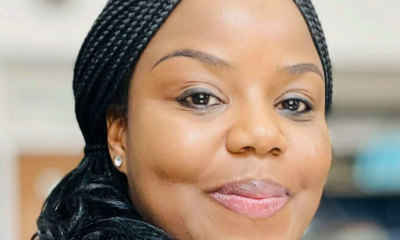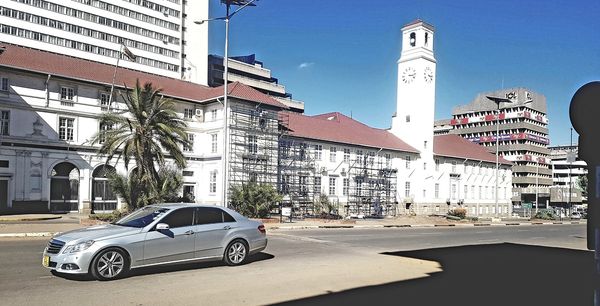
News
Impeachable …Mnangagwa: A creature of constitutional violations
Published
8 months agoon
By
NewsHawksPRESIDENT Emmerson Mnangagwa’s dramatic climb-down and reversal of Zimbabwe Defence Forces commander General Phillip Valerio Sibanda’s unconstitutional appointment into the ruling Zanu PF decision-making administrative organ, the politburo, as an ex officio member has brought to the fore a series of constitutional violations which characterise his presidency.
OWEN GAGARE
Mnangagwa appointed Sibanda into the politburo last month at the end of the Zanu PF annual conference in Gweru, but was pressured to reverse it after initial resistance.
“To fill the vacancy, I am appointing Cde Rose Mpofu of Matabeleland South province as a Politburo member and the new Secretary for People with Disabilities.
Additionally, ‘Cde Gwenzi’, General Philip Valerio Sibanda, as an ex-officio member of the Politburo,” Mnangagwa said.
208: Conduct of members of security services
(1) Members of the security services must act in accordance with this constitution and the law;
(2) The move was widely and swiftly criticised as unconstitutional and unlawful. Section 208 of the constitution provides for conduct of members of security services, specifically prohibiting acting in a partisan manner and furthering interests of any political party or cause.
Neither the security services nor any of their members may, in the exercise of their functions —
(a) act in a partisan manner;
(b) further the interests of any political party or cause;
(c) prejudice the lawful interests of any political party or cause; or
(d) violate the fundamental rights or freedoms of any person.
(3) Members of the security services must not be active members or office-bearers of any political party or organisation; and
(4) Serving members of the security services must not be employed or engaged in civilian institutions except in periods of public emergency. However, Mnangagwa insisted on it as brazenly illegal as it was amid a storm of protest.
“People are mistaken, they think that General Sibanda is a civil servant. He is not a civil servant; first point. Second point, he is an ex-officio member of the politburo which means that he is not a substantive member of the politburo, he cannot vote in the politburo. He is ex-officio. So, there is no problem, there is no contradiction. He is just a civil servant and I as the President can appoint anybody as an ex-officio member which means by virtue of a certain particular position you can be allowed to sit in our substantive body of the politburo. That’s how it is. I don’t know who gets offended by him sitting in the politburo. He cannot vote, but he can contribute.”
But the public pressure was unrelenting.
On Friday, Harare human rights lawyer Kudzi Kadzere wrote to Mnangagwa through Mbidzo, Muchadehama & Makoni Legal Practitioners, demanding reversal of Sibanda’s appointment within 10 days.
The lawyer wrote: “Your Excellency, the term ‘ex-officio’ is Latin meaning literally ‘from the office or by right of office.’
According to the Merriam-Webster Dictionary, ex officio means ‘as a result of one’s status or position’ or denoting or relating to a member of a body who holds the role as a result of their status or another position they hold.
“In a board setup an ex officio member of the board has all the same rights, privileges, duties, an obligations as any other board member, although in the some cases the ex officio member cannot vote.
“It is therefore evident that your appointment of General Sibanda as an ex-officio member of the Zanu PF politburo puts a serving Commander of the Defence Forces in an invidious position of acting or being seen as acting in a partisan manner, furthering the interests of the Zanu PF political party prejudicing the interest of opposition political parties and being seen or perceived as an active member or office bearer of the Zanu PF political party especially given that he was appointed into the highest decision making body of Zanu PF,” Kadzere’s lawyers said.
“We are instructed to demand that you reverse the appointment within the next ten (10) days failing of which our client will no choice but approach the court of law for redress.” A day after Kadzere’s letter, Mnangagwa quickly retreated and reversed the appointment.
In a statement, Mnangagwa’s spokesperson George Charamba said: “His Excellency the President, Dr E.D. Mnangagwa, has announced the staying of General PV Sibanda’s appointment to the ruling Zanu PF Party Politburo as an ex-officio member. The position will be reviewed at the expiry of General Sibanda’s term as a senior serving officer at the helm of the Zimbabwe Defence Forces, ZDF. This deferment of the appointment resolves the apparent conflict with the country’s constitution which regulates the conduct of serving members of the security services.”

Coup and legitimacy
Mnangagwa’s presidency is the product of unconstitutional usurpation of power. He seized power in a coup in November 2017.
The military sought to justify the coup on the basis that there were divisions in the party in government — Zanu PF and it wanted to remove criminals around the president and restore the legacy of the liberation struggle.
The military demanded, among other things, the reinstatement of those Zanu PF party members who had been removed from their government and party positions, including Mnangagwa.
By brazenly involving itself in Mugabe’s succession politics and the national political question, let alone aligning itself with a political party, the military violated a number of constitutional provisions that prohibit involvement of the security services in politics.
Several individual freedoms and political and civil liberties, including the right to freedom of expression, freedom of movement and assembly, the right to security and freedom from torture, were violated during the coup.
There was loss of life directly linked to the coup. In effecting the coup, the military immobilised the police and intelligence services and arrogated to itself the role of civilian policing, including the setting up of roadblocks on major roads and arresting and detaining those it identified as “criminal elements”.
After toppling the constitutional order in the process of ousting Mugabe, Mnangagwa tried to cover up his tracks. He then tried to cover up his tracks through party and court process which subsequently followed to ensure legitimacy. In Zanu PF, he convened a party central committee meeting on 19 November 2017 after the coup to install himself as party leader.
That was followed by an extraordinary congress the following month to legalise his seizure of power. On the day Mnangagwa was sworn in — 24 November 2017 — High Court Judge President George Chiweshe issued two incredible judgements: The coup was constitutional and Mnangagwa’s dismissal by Mugabe was null and void.
This was later reinforced by Chief Justice Luke Malaba when he ruled that Mugabe had voluntarily resigned. However, Zanu PF member Sybeth Musengezi later took Mnangagwa to court — not in his personal, but official capacity as Zanu PF leader — saying he was not properly elected as head of the ruling party by the central committee on 19 November 2017 after the coup.
Besides the coup itself, Mnangagwa came into power without following constitutional procedure; allowing the last acting vice-president Phelekezeka Mphoko to act as president in the interregnum, which was unconstitutional.
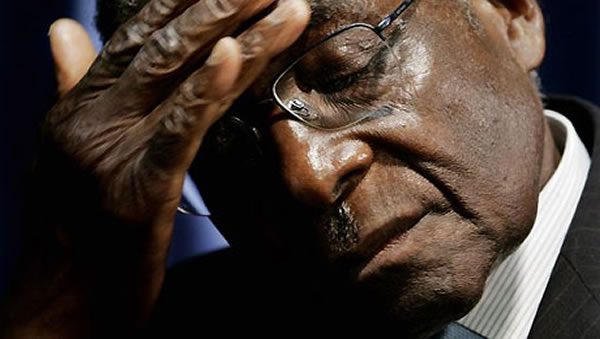
Implicit bargain
Soon after Mnangagwa took over power on 24 November 2017 — three days after the late former president Robert Mugabe was pressured under house arrest by the army and through threats of a Gaddafi-style execution by angry mobs to resign — he did what usurpers usually do: use judges to ensure legal legitimacy.
Political legitimacy — Mnangagwa’s holy grail — was to be secured through the 2018 elections.
Some usurpers just amend the constitution, change the law and even cashier judges to protect themselves against prosecution for treason, incarceration or execution.
Chiweshe ruled that former president Mugabe’s defenestration of his then deputy Mnangagwa prior to his return to seize power was illegal and that the coup constitutional.
Malaba dismissed an application by two fringe political outfits seeking nullification of Mnangagwa’s rise to power and incumbency which they had argued was unconstitutional and illegal.
Malaba said Mnangagwa’s ascendancy was legal and procedural as Mugabe’s resignation was free, voluntary and in terms of the law.
Most judges rely on the dodgy Dosso jurisprudence which can be traced to the judgement of the Pakistan Supreme Court in State v Dosso, a decision that has been termed “a carte blanche for treasonable conduct”.
Local judges relied on this and the doctrine of necessity to justify their decisions.
There is a rich history of case law within the Commonwealth, where there have been legal challenges to the unconstitutional overthrow of elected governments.
These cases and incisive commentary on them are set out in an interesting book by Professor John Hatchard and Dr Tunde Ogowewo titled Tackling Unconstitutional Overthrow of Democracies: Emerging Trends in the Commonwealth. Hatchard and Ogowewo develop a new theoretical construct — “the implicit bargain theory” — to explain the existing jurisprudence on coups.
Their study critically examines the evolution of judicial decisions on the subject. In doing so, it also evaluates jurisprudential theories underpinning these judgements.
The position of the Commonwealth, especially given its strong stance against unconstitutional overthrow of governments, is clearly articulated. Ironically, the Harare Commonwealth Declaration of 1991 and the subsequent Millbrook Commonwealth Action Programme on the Harare Declaration (1995), cite coups as particularly grave violations of their principles.
Zimbabwe is trying to go back Commonwealth after pulling out following diplomatic clashes with Britain almost two decade ago. After the Harare coup, judges were on the frontline of events and debate. Hatchard and Ogowewo explain why.
“To understand the nature of the existing jurisprudence on coups it is important to understand what in fact produced it,” Hatchard and Ogowewo write.
“For this, a new theoretical construct — “the implicit bargain theory” — is introduced to tell the story. “Judges are important players when there is a coup. The immediate effect of a coup is to eliminate two branches of government — the executive and the legislature. The judiciary is left intact.
“The judiciary is left intact for two reasons. First, because judicial affirmation of the regime of usurpers confers legitimacy on the usurpers.
Second, because characterised by law and order, and an existing judicial system — even if tweaked — is indispensable.”even usurpers need to govern in a system
Constitutional violations The constitution of Zimbabwe is very clear on how the President should exercise his powers.
The powers can only be exercised as provided for by the constitution. Zimbabwe is a constitutional democracy.
This means the constitution is the highest law of the land. Parliament cannot pass a law which goes against the constitution.
The executive cannot make policies that violate the constitution. No person — not even the President — is above the constitution.
The courts and government must also make sure what they do is constitutional. When it comes to appointments that the President can make, the constitution provides for that.
What the President has is discretion on who he gets to appoint, but even in that vein the discretion is guided.
The constitution tells the President from which pool he must exercise his discretion. This is important in a democracy as it does not create a rogue President who just acts according to his whims and caprices, but one guided by the aspirations of the people.
Unconstitutional inauguration After the controversial and disputed 23 and 24 August general elections, President Emmerson Mnangagwa was inaugurated as the President of the Republic of Zimbabwe.
The inauguration had its own constitutional controversies in its timing.
Section 93(1) of the constitution gives an aggrieved candidate in an election the opportunity to challenge the validity of an election of a President by lodging a petition or application with the Constitutional Court within seven days after the date of the declaration of the results of the election.
The Zimbabwe Electoral Commission announced results on 26 August 2023 and the opposition had seven days to file their petition.
The seven days lapsed on Saturday 2 September 2023. However, section 336(2) of the constitution provides that whenever the time for doing anything in terms of the constitution ends or falls on a Saturday, Sunday or public holiday, the time extends to and the thing may be done on the next day that is not a Saturday, Sunday or public holiday.
Technically, a petition could have been filed on Monday 3 September 2023 since the seven days envisaged in section 93(1) of the constitution to file a petition fell on a Saturday, hence Monday 3 September 2023 was the final day the petition could be filed.
However, inauguration was set for the very same Monday 3 September 2023. Constitutionally, the inauguration was not supposed to have taken place on that day since it was still within the seven days period. Inauguration should have taken place any other day soon after 3 September 2023. This means Mnangagwa’s inauguration was unconstitutional.
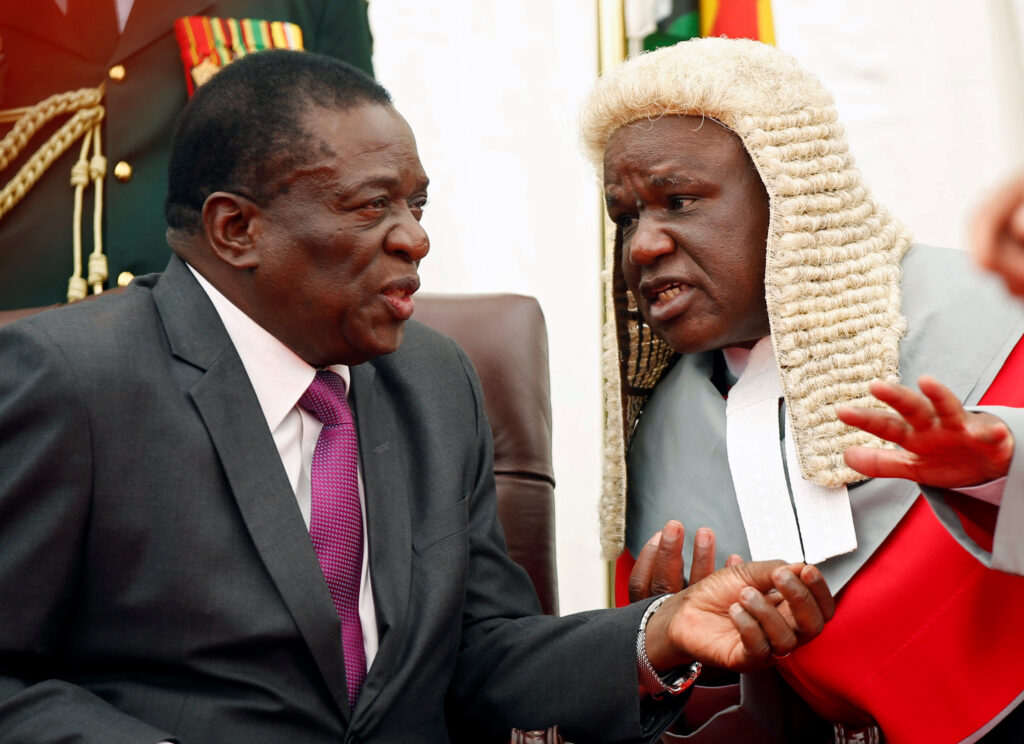
Compromised judges
If any one of the losing candidates — particularly main opposition CCC leader Nelson Chamisa — had filed a petition after Mnangagwa’s inauguration within the seven-day window, the country would have plunged into a constitutional crisis of having an inaugurated President whose election is subject to a constitutional challenge.
The challenge would have been before a Constitutional Court headed by Chief Justice Malaba, who administered the oath of office to the challenged president with his fellow Constitutional Court judges being part of the entourage to the inauguration. What makes it worse in this case is that Mnangagwa had in 2021 controversially extended Malaba’s tenure by one renewable year upon his looming retirement, thus amending the constitution before the elections.
That meant Malaba was now fatally compromised, serving at the pleasure of the President without constitutional protection; thus no checks and balances between the executive and judiciary.
Under section 186 of the constitution, as it was originally enacted, all judges retire on reaching their 70th birthday.
There was no provision for them to continue in office after they reached that age, except to complete any part-heard cases they had left unfinished.
Then in January 2021 constitution of Zimbabwe Amendment (No. 2) Bill was published and it proposed to change section 186 so that judges of the Constitutional Court and Supreme Court would be allowed to continue in office for up to five years after reaching the age of 70, subject to the President being satisfied they were physically and mentally fit to continue serving as judges.
The Bill was fast-tracked through the National Assembly in late April and was passed with extensive committee stage amendments. One of the amendments was highly significant.
A new version of section 186 contained a subsection saying that notwithstanding section 328(7) of the constitution, the new provision for judges to stay in office after the age of 70 would apply to all the judges of the Constitutional and Supreme Courts, including the Chief Justice and the deputy Chief Justice — implying though not actually saying that it would apply to all the judges currently in office.
Having passed through the National Assembly on the 20 April 2021, the Bill went through its remaining stages with remarkable haste.
It had become apparent during the Bill’s fasttracked passage through Parliament that the government was determined it should become law before Malaba’s imminent 70th birthday on 15 May 2021, when he was required by law to retire.
This was confirmed when it became known that the Office of the President’s had sent a letter dated 11 May to Malaba informing him that the President had accepted his election to serve until he turned 75 and the medical certificate he had submitted.
Two civil society organisations, the Zimbabwe Human Rights NGO Forum and the Young Lawyers Association of Zimbabwe, filed separate applications in the High Court challenging the extension of the Chief Justice’s term of office.
Supreme courts.
The two applications were heard together on the afternoon of Friday 14 May by a three-judge bench consisting of Justices Happias Zhou, Jester Helena Charewa and Edith Mushore.
The hearing lasted until early the following morning. On the afternoon of 15 May the judges gave their decision, saying Malaba had fully served his tenure and was no longer Chief Justice.
The Supreme and Constitutional courts later reversed the decision, violating the cardinal rule of natural justice nemo judex in causa sua (no one can be judge in their own cause), while damaging their integrity and credibility.
Mnangagwa’s second coming as President of the Republic — if not third coming considering he arrived on the scene accompanied by guns and not the ballot — took off on constitutionally shaky or dubious grounds.
Unconstitutional cabinet
On 11 September 2023, soon after his inauguration, Mnangagwa constituted a cabinet as mandated by section 105 of the constitution.
Section 104(3) of the constitution mandates the President to appoint ministers and deputy ministers from among senators or Members of the National Assembly. The President can appoint seven ministers or deputy ministers outside of parliament and these are chosen for their technocratic skills and competence.
However, on 11 September the President appointed nine ministers from outside parliament, two more than the constitutionally required threshold.
Two of the appointed ministers, the proposed minister of Provincial Affairs for Manicaland Nokuthula Matsikenyere and deputy minister of Tourism and Hospitality John Paradza, had to be reversed after the constitutional violation was raised.
It was not the first time it happened. This once again against raised the question of whether Mnangagwa — a lawyer himself — has an effective legal adviser.
It brought into question the role of Nelson Charumbira who is supposed to provide legal counsel the Office of the President and Cabinet.
Provincial Affairs ministers
The 11 September 2023 appointments included ministers of Provincial Affairs. What must be noted is that the constitution does not provide for such ministers, but rather it provides for provincial councils.
These councils are established in terms of Chapter 14 of the constitution in line with the requirement for devolution of governmental powers and responsibilities.
Ten years after the enactment of the constitution, Chapter 14 of the supreme charter has been ignored.
Provincial councils have not been set up and, instead, ministers of Provincial Affairs have been appointed. Yet another clear and blatant violation of the constitution.
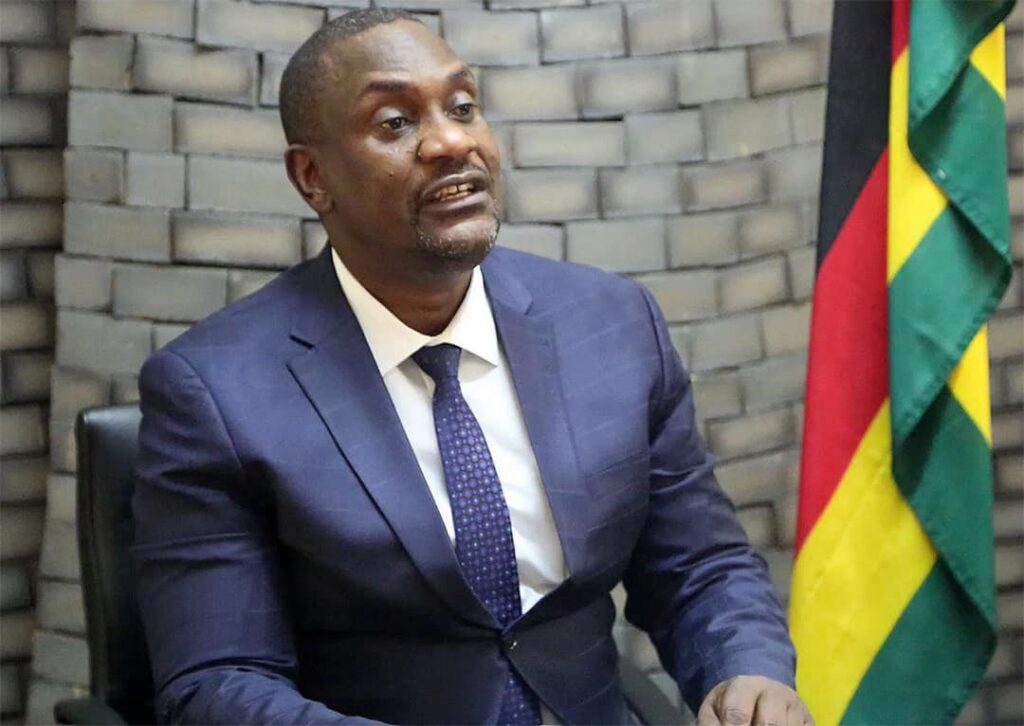
Minister of Intelligence
The President has the prerogative to create ministries that he thinks can advance the constitutional agenda of the Republic of Zimbabwe.
However, the constitution prescribes the setting up of certain ministries.
Section 201 of the constitution provides that the President must appoint a minister to be responsible for the Civil Service who is currently July Moyo.
Section 215 provides that the President appoint a minister of Defence Forces, currently Oppah Muchinguri-Kashiri.
Section 220 provides that the President must appoint a minister responsible for the Police Services, currently Kazembe Kazembe in charge of the ministry of Home Affairs.
Section 225 provides that the President must appoint a minister responsible for national intelligence services.
Section 228 provides that the President must appoint a minister responsible for the Prisons and Correctional Services, currently Ziyambi Ziyambi under the ministry of Justice, Legal and Parliamentary Affairs.
The President has not appointed the minister of intelligence services. The post has been vacant since 10 January 2022 when Owen Ncube was fired from the post by the President.
Ncube was not replaced, with the ministry running through the Central Intelligence Organisation (CIO) Director-General Isaac Moyo and no political head as demanded by the constitution.
On 11 September 2023, the President had an opportunity of upholding the constitution on that, but there seems to be no care in the world to respect the Supreme Law of the land.
The intelligence services are being run in an unconstitutional and creepy manner that are divorced from being unlawful, which is why the country has seen so many unintelligent decisions.
Faz and elections
The CIO-run Forever Associates Zimbabwe (Faz), which unconstitutionally seized control of the running of the 2023 elections on 23 and 24 August to retain Mnangagwa and Zanu PF in power, deeply penetrated communities and tightened its grip on the electoral process, an investigation by The NewsHawks before elections showed.
While Mnangagwa and Zanu PF leveraged the military to win the 2018 elections and other previous polls, this time round the CIO, working with other state institutions, including the police and army forming a quasi-securocratic unit, ran the show to ensure Mnangagwa’s re-election amid fears of internal sabotage.
The military always ran the elections, mainly since 2000 — evidence of militarisation of Zimbabwean politics markedly since the Mgagao Declaration in 1975.
Sidelined army commanders aligned to Vice-President Constantino Chiwenga, who ran the last elections and previous ones under the late former president Robert Mugabe, are sulking and furious about this strategy.
The investigation showed Faz had spread its tentacles to every ward in the country, collecting vital voters’ details right down to household level using an army of 5 910 information gatherers.
The information gatherers — three in each of the country’s 1 970 wards —worked under the close supervision of their CIO handlers.
Each information gatherer is being paid US$380, meaning government is spending US$2 245 800 monthly on unbudgeted salaries.
They also got generous portions of the local currency as part of their salaries. In previously elections, Zanu PF has received election funding from dodgy business people and the sale of minerals, such as diamonds, whose funds are not sent to Treasury.
The scientific-like CIO strategy enabled Zanu PF to control the electoral process in terms of structures, numbers of registered voters and the actual voting process, as well as polling stations.
It also promoted systematic voter intimidation and victimisation, especially at ward level.
An operational Faz document titled Faz Campaign Scope, seen by The NewsHawks at the time, said the organisation had penetrated all provinces up to household level through several tactics, leaving voters vulnerable to abuse during the 23 August elections.
Critical information being collected by the agents and informers includes names, addresses, identity numbers and voter registration details at polling station level.
Faz also counted people at household level before recording the information on their tablets and smartphones.
The information which was computed, condensed into data and processed was crucial in influencing and manipulating the electoral process in favour of Zanu PF through a combination of tactics, including persuasion and intimidation, in some cases.
It was also being used to predict potential outcomes, using real figures, so that Zanu PF knows which constituencies and wards to put campaign resources in or activate its coercive machinery.
Faz, registered as a private organisation focusing on philanthropic work, is led by CIO co-deputy director-general retired Brigadier-General Walter Tapfumaneyi at national level.
The NewsHawks previously gathered and reported that Faz received an initial disbursement of US$10 million and 200 cars to run its affairs in preparation for elections.
Additional resources have been promised to capacitate the secret structure. The mandate of Faz, working together with the Zimbabwe Electoral Commission and its chair Justice Priscilla Chigumba, was to coordinate logistics and security forces to retain Mnangagwa in power.
The NewsHawks investigation, which also focused on Masvingo, also established that Faz had structures at national, provincial, district, constituency and ward levels — where minute details are collected for use in the electoral process.
The organisation was visible countrywide and has been sending shivers down the spines of many, especially opposition supporters, particularly in rural areas.
It displaced the army’s structure called Heritage which used to perform a similar role and other functions.
The Faz operation, which secured Mnangagwa re-election, was clandestine and unconstitutional.
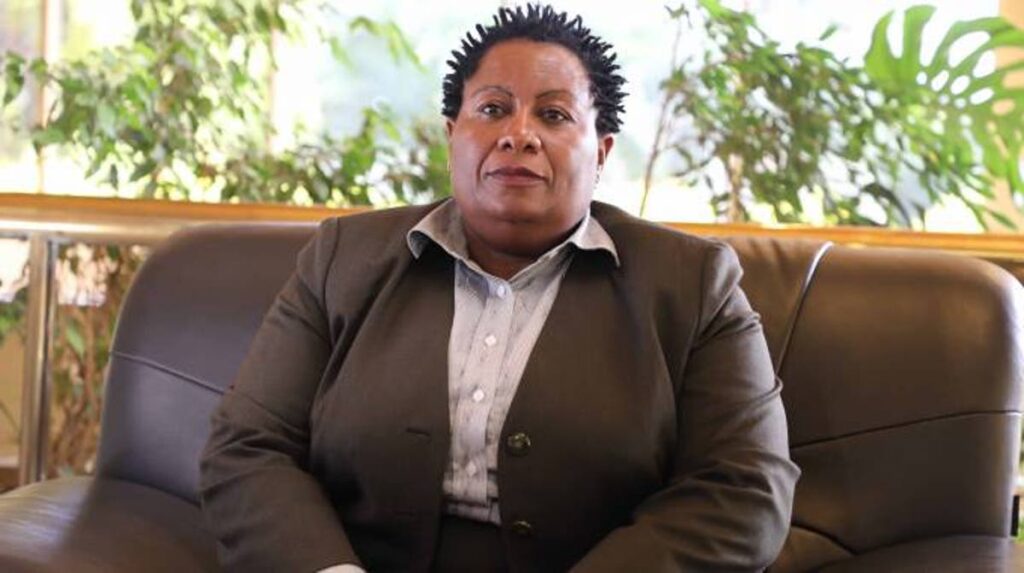
Justice Matanda Moyo
On 1 March 2022, the then Prosecutor-General of Zimbabwe Kumbirai Hodzi resigned from his position on medical grounds.
The post of Prosecutor-General itself has been hounded from the time it was still located in the Attorney-General’s office. It is a poisoned chalice.
Recent memory recalls how Sobusa Gula-Ndebele — who has been very unwell of late — was appointed to the position in 2006 by the late former president Robert Mugabe before he was placed on suspension in 2007 followed by his dismissal in 2008.
The late Johannes Tomana who died in August was then appointed the Attorney-General, with his position becoming a contentious issue of the Government of National Unity (GNU).
The man occupying the post literally became an outstanding issue throughout the GNU, together with the issue of former Reserve Bank of Zimbabwe governor Gideon Gono and provincial governors.
When the 2013 constitution was enacted, Tomana became Zimbabwe’s first Prosecutor-General. His term of office ended with him being fired by Mugabe in 2017 after being accused of obstructing justice, but in reality for aligning with the army in the Zanu PF succession matrix.
From an outstanding issue, Tomana had to stand by the side until his appointment as ambassador to the Democratic Republic of Congo by the Mnangagwa.
Ray Goba, the veteran lawyer and prosecutor now based at Harare Law Chambers, then became the Prosecutor-General in 2017, but his term of office was short-lived after he was suspended and a tribunal was set up to inquire into his fitness to hold office.
As per the requirements of the constitution as it was then before it commenced, public interviews were held in 2018 for the post, with the President controversially appointing Hodzi as the Prosecutor-General.
Hodzi had come a distant number seven in the public interviews, but was still appointed.
A challenge was filed in the Constitutional Court, but instead lawyers who had filed the challenge ended up being arrested and the case never saw the light of day just like Hodzi did not see his term out as he also resigned.
The President only replaced Hodzi after the August 2023 elections. The long overdue appointment was made in terms of section 259 of the constitution.
The appointment procedure that used to require that public interviews be conducted was changed through the second amendment of the constitution.
Mnangagwa now simply appoints without the necessary rigours of a consultation process that subjected a candidate to public scrutiny.
These posts are held on behalf of the public, but, well, the public does not matter except during elections.
Conflict of interest
The President recently appointed former chairperson of the Anti-Corruption Commission Loice Matanda Moyo as the new Prosecutor-General.
Her competence to hold the post is the subject of another day, but this is a judge of the High Court being appointed to head an institution that is tasked with instituting and undertaking criminal prosecutions on behalf of the state.
These criminal proceedings are undertaken before the very institution or judiciary that Moyo is a judge in. More than a month after her appointment, she has not resigned; she is still very much a judge and prosecutor.
How can one person be a prosecutor and judge at the time? Does it get any more unconstitutional than this?
In Moyo’s hands, as things stand, lies the judiciary function and an executive functions and responsibilities.
The two must be separated for a healthy democracy. A judge and a prosecutor have respective duties.
They have different roles. So it is clear Moyo cannot be both a prosecutor and judge at the same time.
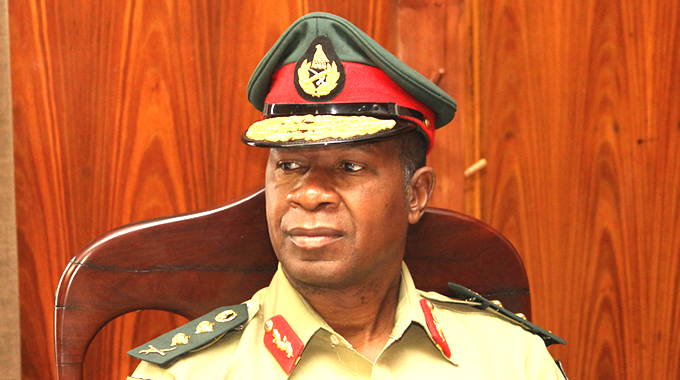
General PV Sibanda
Section 208 of the constitution provides for conduct of members of security services. The section provides that security services nor any of their members may not, in the exercise of their functions, act in a partisan manner, further the interests of any political party or cause.
Zanu PF as a political party has partisan political interests. The appointment of Sibanda within party ranks flew in direct confrontation with the constitution.
The violation was brazen. It was a potentially impeachable offence.
Even though the Sibanda appointment was stayed or reversed, Mnangagwa and his government remain tied in knots of unconstitutionalism and a series of illegalities.
You may like



